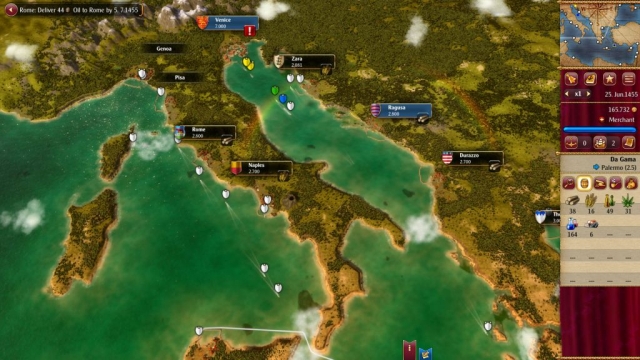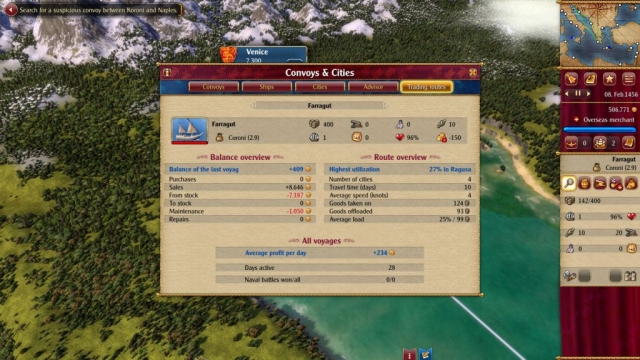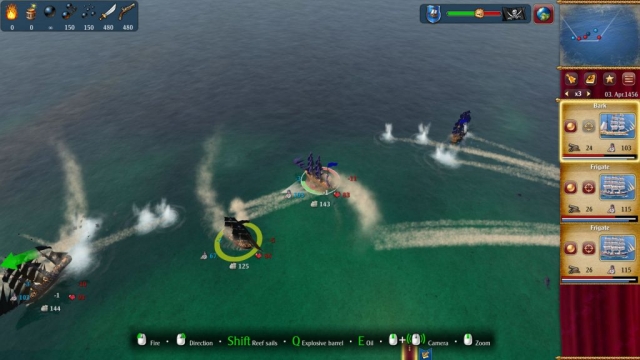Rise of Venice

Rise of Venice is the latest seafaring simulation from Gaming Minds Studio, which in recent years has also released Patrician IV: Rise of a Dynasty (in 2010) and Port Royale 3: Pirates and Merchants (in 2012). These sea merchant / pirate games aren’t really my specialty — the last one I played was the original Port Royale (in 2003), and apparently I thought so little of it that it caused me to stay away from the genre for the last ten years. Sadly, Rise of Venice isn’t an improvement, so you might have to wait until 2023 before I review Australian Sea Trading III, or wherever the genre travels from here.
Rise of Venice takes place in the Mediterranean Sea during the 15th century. You start out as a lowly sea merchant with a couple of ships and no real prospects. Then by buying goods where they’re cheap and selling them where they’re expensive, you gain some money and some power, which allows you to expand your empire. With enough success, you can vie for a seat in Venice’s Council of Ten, or you can throw in with another family and get married, starting a dynasty. You can also become a lender of money, a builder of businesses, a saboteur of competitors, a hunter of pirates, and a seeker of lost treasures.
The core to Rise of Venice is its economic simulation. There are 25 cities that you can visit in the game, including Venice, Athens, and Alexandria. Each city produces a handful of the game’s 22 resources, giving you a location where those resources are cheap and plentiful, but the cities also have a need for some of the other resources, giving you places where you can sell them for a (sometimes dramatic) profit. And so for a lot of the game what you do is sail around visiting cities, buying goods where they’re cheap and selling them where they’re expensive. The game presents this information clearly, and so it’s easy to see where you should buy or sell.
While you’re building up your profits, you also need to build up your rank. There are two parts for this. The easier part just requires you to pass certain thresholds, such as exceeding a particular net worth for your company, employing ships with a particular storage capacity, and hiring enough sailors (on your ships) or workers (in your businesses). The more difficult part involves gaining influence with Venice’s Council of Ten. The ten families with seats on the council have to vote on whether you deserve a new rank or not, and convincing them can mean completing quests for them, or doing things they like (such as defeating pirates), or — and most likely — paying them oodles of bribe money.
Your rank is important because the higher it is, the more things you unlock. When you start out in the game, you’re only allowed to trade in a few goods and use a few of the weaker ships, and this limits how much profit you can make, and it also makes you more vulnerable to pirates (who apparently don’t need any rank whatsoever to score powerful ships). Then as you rise in rank, you gain access to more goods and ships, and you also get a chance to join the Council of Ten yourself, get married, and more. The problem is, each time you gain a rank, the tougher it gets to convince the council to vote for you, and the more money you have to spend in bribes. Of course, if you don’t really care about sailing the high seas in a carrack carrying glass and clothing, you can just ignore the council and keep your money.
Along with shipping activities, there are also buildings you can construct in each city. These include warehouses (which for some reason are required if you want the computer to control some of your ships for you), production businesses (to make some resources more plentiful in a city), houses (so the city can expand), hospitals (to prevent epidemics), and more. Unfortunately, what the game doesn’t include is any way to see if your buildings are actually helping you. All you get is a “balance” screen with one line for rental income and another for building costs. That’s it. So you have no way of knowing if a housing complex in Antioch or a glassworks in Venice is actually improving your situation.
At this point Rise of Venice might sound like it could be fun — and perhaps it could be, at least theoretically. But in practice, the game is a disaster. When it was actually working well for me (maybe 60% of the time) I found it to be dull. During the other times, when it was crashing every five minutes, or I was trying to figure out why an automatic trade route wasn’t moving or a warehouse wasn’t buying anything, it was aggravating and irritating. There are just too many bugs and design flaws for the game to be any fun.
Let me give you an example. While you’re sailing around, you can get attacked by pirates. If you surrender to the pirates, then they simply take 20% of your cargo and leave, but if you fight them, then at best you take damage to your escorts before driving them off, and at worst you lose your escorts and the pirates take more than 20% of your cargo because they’re ticked off at you. Now, even for the best case scenario, it costs you money to have your escorts repaired, during which time your cargo ships are stuck in port. Plus there are the extra maintenance costs for having escorts at all. Do you see where this is going? If it’s not actually cheaper to allow pirates to have their way with you, then it must be pretty close, which is stupid.
Or consider treasure maps. Each treasure map consists of nine pieces, which you can pick up while completing quests for council members. This sounds promising — who doesn’t like looking for treasure? — but here’s the dumb part. Treasure chests always appear floating in the water, and so the maps aren’t guaranteed to show any land, which means you might not receive any clue about where the treasure is located. The first time I completed a treasure map, all I ended up with was a nondescript gray map with a red X in it, and it took me an hour of carefully sailing around the Mediterranean to find the treasure. Too many parts of the game are like this, where a little more attention to detail would have gone a long way.
But here’s some good news. On the off chance that you enjoy Rise of Venice, there are a variety of game modes that you can try out. There’s a 20-hour campaign that introduces you to all of the game mechanics, where you get to play a young captain named Da Narmi and help protect Venice from traitors. There is also free play mode, where you can do whatever you want, and scoreboard matches, where you have certain goals. The campaign can only be played alone, but free play mode and scoreboard matches can be played by yourself or with others over the Internet.
Suffice it to say, I didn’t enjoy Rise of Venice at all. It crashes too often, it doesn’t explain itself well (and for some reason the tutorial video is hidden in the quest journal), and the endless buying and selling just gets tedious, especially since automating the process seems to remove any chance of actually earning a profit with it, or at least that’s how it worked for me. One thing I’ve learned during my time as a reviewer is that no matter what the product is, some people will like it and some people won’t, no matter what. So it’s possible I’m in the vast minority and Rise of Venice is actually a quality game, but I don’t think so. It’s a game to stay well away from.
Reviewed By: Steven Carter
Publisher: Kalypso Media
Rating: 57%
——————————————————————————–
This review is based on a digital copy of Rise of Venice for the PC provided by Kalypso Media.
 Game Over Online
Game Over Online












I liked your review except I think you did not put enough time/effort into learning the route planner/trading system. I find the game pretty enjoyable and it has not crashed on my once in the 28 hours of game play so far. If I were to amend your review i’d give it a 71%
I have been playing this for the last couple of days and honestly find it to be exactly what I was looking for. It attracts a certain audience and everybody outside of it will only find it tedious and boring. I love this game and would recommend it to anybody who enjoys politics, micromanaging, and trading in general.